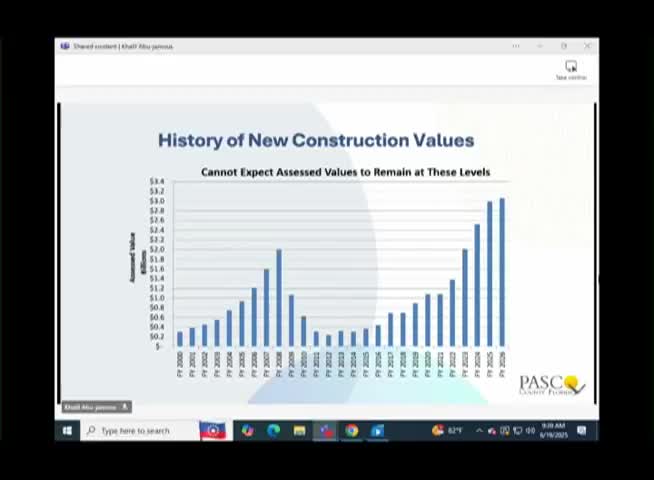County reports $37M property tax revenue increase amid market stabilization
June 20, 2025 | Pasco County, Florida
Thanks to Republi.us and Family Scribe , all articles about Florida are free for you to enjoy throughout 2025!

This article was created by AI using a video recording of the meeting. It summarizes the key points discussed, but for full details and context, please refer to the video of the full meeting. Link to Full Meeting
County officials noted that while the rapid growth in new construction is expected to stabilize, they do not foresee a drastic decline in property values. This cautious optimism stems from lessons learned during the recent recession, suggesting a more leveled approach to future growth. The county's taxable assessed value is influenced by several factors, including new constructions, revaluations of existing properties, and market dynamics, particularly the influx of out-of-state buyers during and after the COVID-19 pandemic.

Before you scroll further...
Get access to the words and decisions of your elected officials for free!
Subscribe for FreeThe property appraiser's June 1 report indicated a 9.5% growth in assessed values, with revaluations contributing significantly to this figure. Last year, revaluations accounted for a staggering 78%, but this year, the number has cooled to 34%. This shift reflects the anticipated stabilization in the housing market, prompting the board to model revenue growth conservatively at 5%, 7%, and 9%.
The financial implications of these trends are significant. The county expects an increase of approximately $37 million in property tax revenue, with allocations earmarked for various departments, including nearly $14.8 million for the sheriff's office. Other allocations include $700,000 for community redevelopment and $6.1 million for tax increment financing units. However, the general fund faces pressure as sales tax revenues do not match previous growth rates, complicating budget planning.
Looking ahead, the county anticipates starting the fiscal year with a fund balance of $97 million and projected revenues of $583 million. However, expenses are expected to exceed revenues at $629 million, indicating a need to draw from reserves. This could leave the county with approximately $50.6 million in reserves, equating to about 35 days of operating funds, below the preferred 60 days.
The discussions at the workshop underscore the challenges Pasco County faces in balancing growth with fiscal responsibility. As the county navigates these financial waters, the decisions made in this budget workshop will have lasting implications for its services and infrastructure in the coming years.
Converted from 6.19.25 Pasco Board of County Commissioners Budget Workshop meeting on June 20, 2025
Link to Full Meeting
Comments
View full meeting
This article is based on a recent meeting—watch the full video and explore the complete transcript for deeper insights into the discussion.
View full meeting



